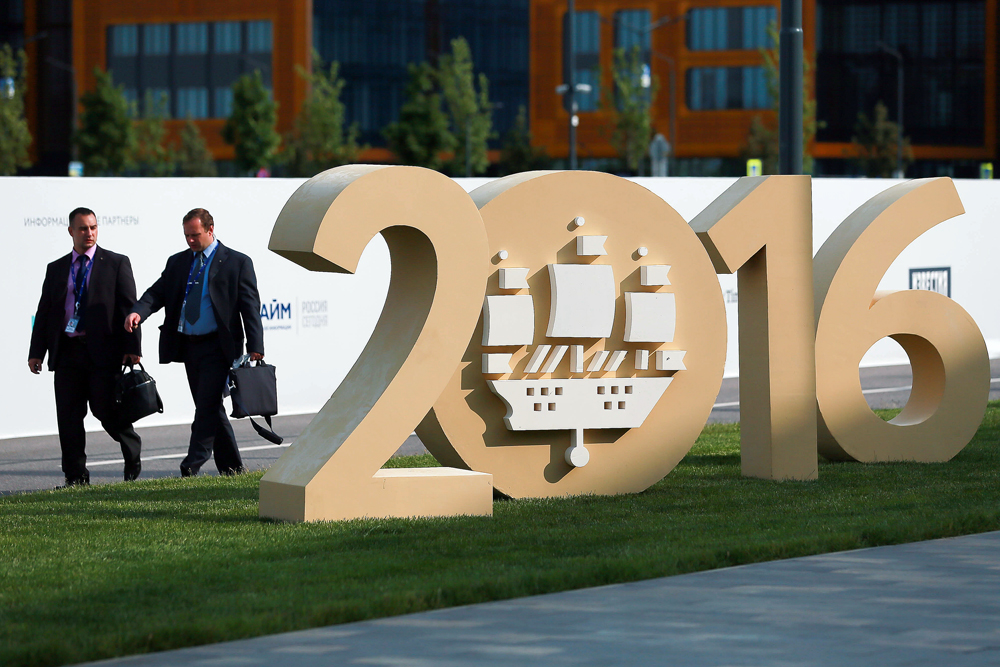
World economists have gathered at the SPIEF 2016 to discuss the future of the global economy.
TASSLeading world economists have gathered at the St. Petersburg International Economic Forum (SPIEF) to discuss the future of the global economy.
The forum, which opened on June 16, will be attended by Russian President Vladimir Putin, UN Secretary General Ban Ki-moon and President of the European Commission Jean-Claude Juncker.
According to Russian presidential press secretary Dmitry Peskov, during the official meetings at the forum Putin will discuss the future of the Nord Stream 2 gas pipeline, which is to run from Russia to Germany along the Baltic seabed.
Another matter of discussion will be the mutual sanctions between Russia and the EU that were introduced in 2014 over Moscow’s role in the Ukrainian crisis.
Experts say that even if the subject of a reciprocal softening of the sanctions is not mentioned during the forum, direct talks between Vladimir Putin and Jean-Claude Juncker may see relations between Russia and the EU significantly improve. Since the beginning of the Ukrainian crisis in 2014 no European official of such level has attended the forum.
"I don't expect any kind of breakthrough, but behind-the-scenes talks could help to improve the situation in the future," said Timur Nigmatullin from investment company Finam Holdings.
Georgy Vaschenko, director of operations on the Russian capital market at Freedom Finance, agrees that sanctions will not be softened this year. However, in his view, the fact that these high-ranking officials are attending the forum means that Western leaders are not united in their opinions and some of them are ready for dialogue with Russia. For example, the Italian delegation will be headed by Italian Prime Minister Matteo Renzi.
Many large investment agreements are usually signed during the forum, including those involving international companies. Vaschenko notes that agreements are most likely to be signed in the field of energy, especially with the participation of gas giant Gazprom and Russia's largest oil company, the state-owned Rosneft.
The volume of all agreements signed will be more than $4 billion, said Vaschenko.
One of the largest projects could be the construction by Gazprom and Royal Dutch Shell of a terminal to produce and transport liquid natural gas (LNG) in the Russian northwest.
According to Timur Nigmatullin, the signing of this agreement could become the forum's key event: "Currently, it is known that the total capacity of the plant's two lines will be 10 million tons of LNG annually in the first phase, with the possibility of expansion," he said.
The plant is expected to start functioning at the end of 2021.
In 2016 the forum's official guest country is Italy, which is why 22 of its leading companies will participate in the SPIEF, including Banca Intesa Sanpaolo, tyre manufacturer LLC Pirelli Tyre Russia, the ENEL energy company, Danieli, the producer of equipment for the metallurgical industry, and others.
In turn, the Venezuelan delegation is headed by Energy Minister Eulogio Del Pino, who plans to hold meetings with Russian Energy Minister Alexander Novak and Rosneft President Igor Sechin.
The Kaluga Region, which is located southeast of Moscow and is famous for its automobile production, will discuss the New Silk Road project with the heads of Russian Railways and Samsung, while the Moscow Region anticipates the signing of agreements in the fields of industry, agriculture and infrastructure development.
According to Finam Holdings, the number of agreements signed each year during the forum has been increasing, but their overall value has decreased. In 2013, 102 agreements were signed worth 9.6 trillion rubles ($146 billion), in 2014 there were 175 agreements with a value of 401.4 billion rubles ($6.1 billion) and in 2015 there were 205 agreements worth 293.4 billion rubles ($4.5 billion).
All rights reserved by Rossiyskaya Gazeta.
Subscribe
to our newsletter!
Get the week's best stories straight to your inbox